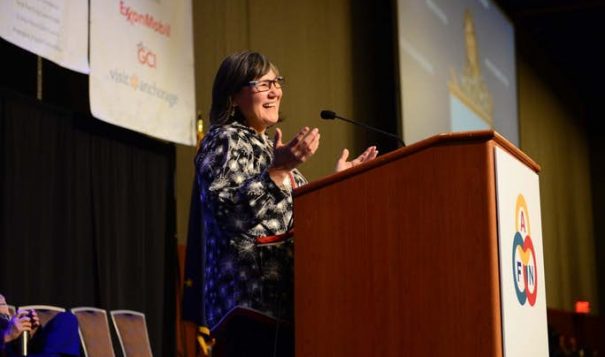 Alaska Lt. Gov. Valerie Nurr’araaluk Davidson speaking at the Alaska Federation of Natives convention last month. She said every community in Alaska has benefited from Medicaid expansion. (Photo: Alaska Federation of Natives)
Alaska Lt. Gov. Valerie Nurr’araaluk Davidson speaking at the Alaska Federation of Natives convention last month. She said every community in Alaska has benefited from Medicaid expansion. (Photo: Alaska Federation of Natives)
Indian Country Today
The Indian Health system was on the ballot across the country last week (even if the words were not explicit.) A few wins. And Alaska is at risk for a big loss.
Voters in three states added new money that will go directly to clinics and basic health services through Medicaid expansion. One of the most important provisions of the Affordable Care Act was to allow states to expand Medicaid making it easier for citizens to quality for basic health insurance. Medicaid is a third-party insurance fund that directly benefits Indian health clinics and hospitals.
Last week three states — Kansas, Wisconsin, and Maine — also voted for candidates for governor that pledged to follow through with Medicaid expansion.
“Following the vote, nearly 500,000 uninsured adults in five states are poised to gain Medicaid coverage under the Affordable Care Act,” according to the Kaiser Health News. “Three deep-red states passed ballot measures expanding their programs and two other states elected governors who have said they will accept expansion bills from their legislatures. Supporters were so excited by the victories they said they will start planning for more voter referendums in 2020.”
But in other states there were costly setbacks. Montana rejected a funding mechanism for Medicaid expansion sending it back to the legislature for further debate. And the election of Mike Dunleavy as the new governor in Alaska means changes ahead for Medicaid in that state. (And Republicans, who never did favor Medicaid expansion, now control both houses in the state legislature.)
Medicaid has become a significant funding stream for the Indian health system, it’s particularly important for the non-profit and tribally-operated clinics and hospitals because by law that money remains at the local unit. And, unlike federal appropriations for the U.S. Indian Health Service, the amount of money grows as more patients become eligible for services. What’s more: The federal government reimburses states 100 percent for treatment at Indian health clinics or tribal facilities.
This is how it works: The Indian Health system — the federal Indian Health Service and the facilities operated by tribes and non-profit organizations — gets funding directly from Congress through appropriations. That appropriation is currently $5.5 billion through a temporary spending bill that will need to be reauthorized by Dec. 7. But Medicaid is a partnership with state governments, and thus, must be approved by each state.
One legacy of Paulette Jordan’s run for governor is that she helped change the conversation about Medicaid expansion in Idaho. Jordan, Coeur d’Alene, was an early supporter of Proposition 2, a ballot initiative to expand Medicaid despite opposition by the state legislature. And voters were clear: The initiative passed by a wide margin, 60 percent supporting expansion and nearly 40 percent opposed. A week before the election, Idaho’s Gov. Butch Otter endorsed the measure and Gov.-elect Brad Little said he will implement the new law.
Utah voters also approved Medicaid expansion. In that state a sales tax increase will be used to pick up the extra costs associated with the public insurance. The Salt Lake Tribune estimated that 150,000 Utahns will quality for the program.

Voters in another conservative state, Nebraska, also picked Medicaid expansion over Republican opposition by both the legislature and Gov. Pete Ricketts.
The Winnebago Tribe of Nebraska recently assumed operational control of the Indian Health Service hospital and renamed it the 12 Clans Unity Hospital. Medicaid expansion could add revenue streams to this facility because more patients would qualify for the insurance. One specific benefit is that Medicaid claims are processed on a regular basis to help facilities cover operational costs, including infrastructure.
Medicaid expansion could also benefit urban clinics in Lincoln and Omaha (as well as a clinic in Salt Lake City). According to the Kaiser Family Foundation one urban Indian health program in Arizona reported that its uninsured rate fell from 85 percent before the Affordable Care Act to just under 10 percent after.
However Montana voters rejected an initiative that would have funded Medicaid expansion through higher tobacco taxes. That state’s Medicaid expansion is set to expire this summer unless the legislature acts. State Rep. Nancy Ballance, a Republican, told Montana Public Radio that Medicaid does not have to end, but that there will be changes. Several lawmakers have called for adding work requirements for Medicaid recipients. (In Arkansas new work requirements resulted in thousands of people being removed from Medicaid eligibility.)
Alaska’s election could result in the biggest and most severe changes to Medicaid and the Alaska Native medical system. Nearly 40 percent of Medicaid clients are Alaska Natives and the state says most patients rely on the Alaska Native health system (which is reimbursed by the federal government) but that two-thirds of the state funds are now spent on private sector health care.
One in five Alaskans is now covered by Medicaid. Last month at the Alaska Federation of Native convention, Lt. Gov. Valerie Nurr’araaluk Davidson, Yup’ik, said Medicaid expansion has benefited every community in the state. As director of the state’s health agency, Davidson was the architect of the state’s Medicaid expansion.
Alaska Gov.-elect Mike Dunleavy has yet to offer a proposal about how he would restructure or end Medicaid expansion in Alaska. He defeated former Sen. Mark Begich, a Medicaid supporter.
The Kaiser Family Foundation reports as of Nov. 7, 2018, 37 states have adopted Medicaid expansion while 14 have not.
Mark Trahant is editor of Indian Country Today. He is a member of the Shoshone-Bannock Tribes. Follow him on Twitter – @TrahantReports
Email: mtrahant@IndianCountryToday.com

